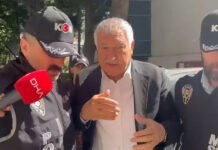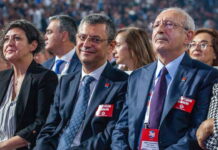The governor of the southeastern city of Şanlıurfa prohibited the staging of a theater play in Kurdish last Friday just hours before the scheduled performance, the Şanlıurfa Bar Association announced in a press statement.
In its statement, which was shared on the association’s Twitter account, the bar association said the decision was made at the last minute and deliberately after working hours. The association also highlighted the timing of the decision, which coincided with Turkey’s President Recep Tayyip Erdoğan’s announcement of a new period of reforms that will include a human rights action plan.
BASINA VE KAMUOYUNA
Şanlıurfa Baromuzca meslektaşlarımıza moral olması için düzenlediği tiyatro etkinliği kapsamında sergilenecek olan “Bêrû” adlı oyunun başlamasına saatler kala ve mesai bitiminde Şanlıurfa Valiliğince hukuka aykırı bir şekilde yasaklanmıştır.
— Urfa Barosu (@UrfaBarosu) November 14, 2020
The play was scheduled as a morale booster for members of the bar association.
The same theater play, “Bêrû,” had been similarly banned by the governor of İstanbul’s Gaziosmanpaşa district last month due to its potential for “disrupting public well-being and safety.”
“Bêrû” is a Kurdish adaptation of Nobel laureate Dario Fo’s play “Trumpets and Raspberries.”
“Tiyatromuz Yaşasın İnsiyatifi,” an initiative to support Turkish theater, said the play had been staged many times and favorably received. “This is a satirical play that deals with the state’s inner conflicts. Forbidding it shows that the authorities are afraid of the theater’s potential to raise awareness among people,” it said.
Speaking about the decision to ban the play in İstanbul, Meral Danış Beştaş, deputy chair of the pro-Kurdish Peoples’ Democratic Party’s (HDP) parliamentary group, had said: “They said a play staged in the Kurdish language has the potential to disrupt public well-being and safety. On the contrary, banning a language spoken by millions of citizens is a disruption of public safety and well-being.”
İstanbul Governor Ali Yerlikaya had tweeted that the play was not canceled because it was in Kurdish but because it disseminated propaganda for the Kurdistan Workers’ Party (PKK). He added that legal proceedings had been initiated.
The PKK is an armed secessionist group considered a terrorist organization by the United States, Turkey and the European Union.
Prohibitions against the use of Kurdish in Turkey go back many years. Kurdish language, clothing, folklore and names had been banned since 1937. The words “Kurds,” “Kurdistan” and “Kurdish” were among those officially prohibited. After a military coup in 1980, speaking Kurdish was officially forbidden even in private life.
Many people who spoke, broadcast or sang in Kurdish were imprisoned. The ban officially continued until 1991. Kurds continue their struggle for Kurdish education in schools in the regions where they live. Between 2010 and 2014, when an attempt was made to solve Turkey’s Kurdish problem by means of an official “peace process,” lectures were given in Kurdish in some schools, and Kurdish signs were installed in the cities. These rights were revoked after the failure of the peace talks.















